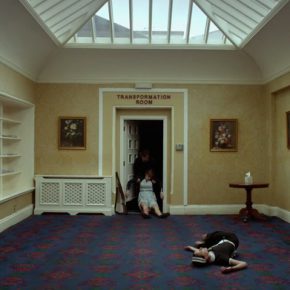The Social Republic appeared as a mere phrase, as a prophecy on the threshold of the February Revolution; it was smothered in the blood of the Parisian proletariat during the days of 1848 but it stalks about as a spectre throughout the following acts of the drama.
The Democratic Republic next makes its bow; it goes out in a fizzle on June 13, 1849, with its runaway small traders; but, on fleeing, it scatters behind it all the more bragging announcements of what it means do to. The Parliamentary Republic, together with the bourgeoisie, then appropriates the whole stage; it lives its life to the full extent of its being; but the 2d of December, 1851, buries it under the terror-stricken cry of the allied royalists: “Long live the Republic!”
The French bourgeoisie reared up against the reign of the working proletariat;—it brought to power the slum-proletariat, with the chief of the “Society of December 10” at its head. It kept France in breathless fear over the prospective terror of “red anarchy;”—Bonaparte discounted the prospect when, on December 4, he had the leading citizens of the Boulevard Montmartre and the Boulevard des Italiens shot down from their windows by the grog-inspired “Army of Order.” It made the apotheosis of the sabre; now the sabre rules it. It destroyed the revolutionary press;—now its own press is annihilated. It placed public meetings under police surveillance;—now its own salons are subject to police inspection. It disbanded the democratic National Guards;—now its own National Guard is disbanded. It instituted the state of siege;—now itself is made subject thereto. It supplanted the jury by military commissions;—now military commissions supplant its own juries. It subjected the education of the people to the parsons’ interests;—the parsons’ interests now subject it to their own systems. It ordered transportations without trial;—now itself is transported without trial. It suppressed every movement of society with physical force;—now every movement of its own class is suppressed by physical force. Out of enthusiasm for the gold bag, it rebelled against its own political leaders and writers;—now, its political leaders and writers are set aside, but the gold hag is plundered, after the mouth of the bourgeoisie has been gagged and its pen broken. The bourgeoisie tirelessly shouted to the revolution, in the language of St. Orsenius to the Christians: “Fuge, Tace, Quiesce!”—flee, be silent, submit!—; Bonaparte shouts to the bourgeoisie: “Fuge, Tace, Oniesce!”—flee, be silent, submit!
The French bourgeoisie had long since solved Napoleon’s dilemma: “Dans cinquante ans l’Europe sera republicaine ou cosaque.” [#1 Within fifty years Europe will be either republican or Cossack.] It found the solution in the “republique cosaque.” [#2 Cossack republic.] No Circe distorted with wicked charms the work of art of the bourgeois republic into a monstrosity. That republic lost nothing but the appearance of decency. The France of to-day was ready-made within the womb of the Parliamentary republic. All that was wanted was a bayonet thrust, in order that the bubble burst, and the monster leap forth to sight.
Why did not the Parisian proletariat rise after the 2nd of December?
https://www.youtube.com/watch?v=4U61E3cgtSc
The downfall of the bourgeoisie was as yet merely decreed; the decree was not yet executed. Any earnest uprising of the proletariat would have forthwith revived this bourgeoisie, would have brought on its reconciliation with the army, and would have insured a second June rout to the workingmen.
On December 4, the proletariat was incited to fight by Messrs. Bourgeois & Small-Trader. On the evening of that day, several legions of the National Guard promised to appear armed and uniformed on the place of battle. This arose from the circumstance that Messrs. Bourgeois & Small-Trader had got wind that, in one of his decrees of December 2, Bonaparte abolished the secret ballot, and ordered them to enter the words “Yes” and “No” after their names in the official register. Bonaparte took alarm at the stand taken on December 4. During the night he caused placards to be posted on all the street corners of Paris, announcing the restoration of the secret ballot. Messrs. Bourgeois & Small-Trader believed they had gained their point. The absentees, the next morning, were Messieurs. Bourgeois & Small-Trader.
During the night of December 1 and 2, the Parisian proletariat was robbed of its leaders and chiefs of barricades by a raid of Bonaparte’s. An army without officers, disinclined by the recollections of June, 1848 and 1849, and May, 1850, to fight under the banner of the Montagnards, it left to its vanguard, the secret societies, the work of saving the insurrectionary honor of Paris, which the bourgeoisie had yielded to the soldiery so submissively that Bonaparte was later justified in disarming the National Guard upon the scornful ground that he feared their arms would be used against themselves by the Anarchists!
“C’est Ic triomphe complet et definitif du Socialism!”‘ Thus did Guizot characterize the 2d of December. But, although the downfall of the parliamentary republic carries with it the germ of the triumph of the proletarian revolution, its immediate and tangible result was the triumph of Bonaparte over parliament, of the Executive over the Legislative power, of force without phrases over the force of phrases. In the parliament, the nation raised its collective will to the dignity of law, i.e., it raised the law of the ruling class to the dignity of its collective will. Before the Executive power, the nation abdicates all will of its own, and submits to the orders of an outsider of Authority. In contrast with the Legislative, the Executive power expresses the heteronomy of the nation in contrast with its autonomy. Accordingly, France seems to have escaped the despotism of a class only in order to fall under the despotism of an individual, under the authority, at that of an individual without authority The struggle seems to settle down to the point where all classes drop down on their knees, equally impotent and equally dumb.
Excerpted from The 18th Brumaire of Louis Bonaparte (1897), by Karl Marx. Published under a Creative Commons license.
Marine Le Pen screenshot courtesy of the BBC. All rights reserved.





